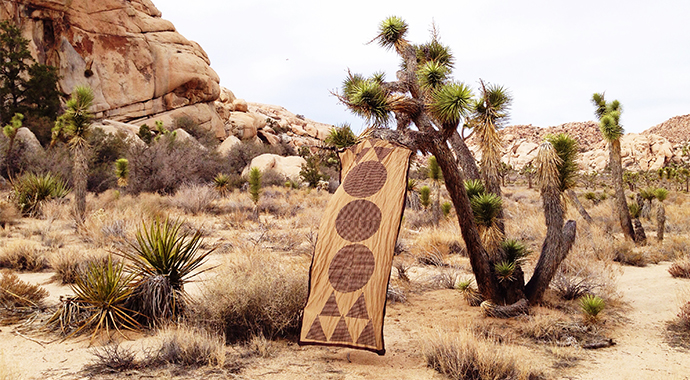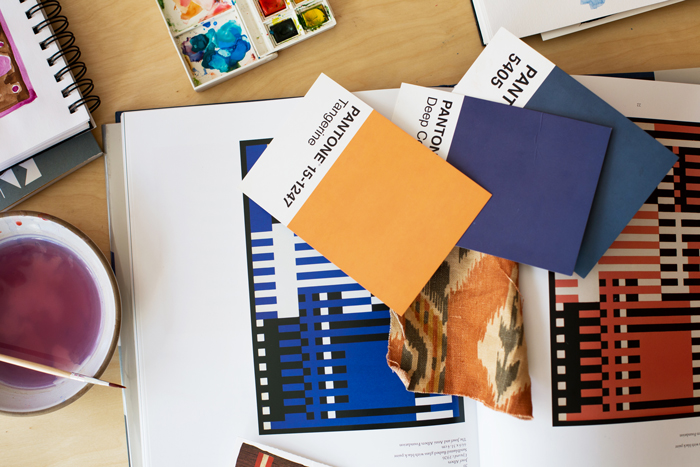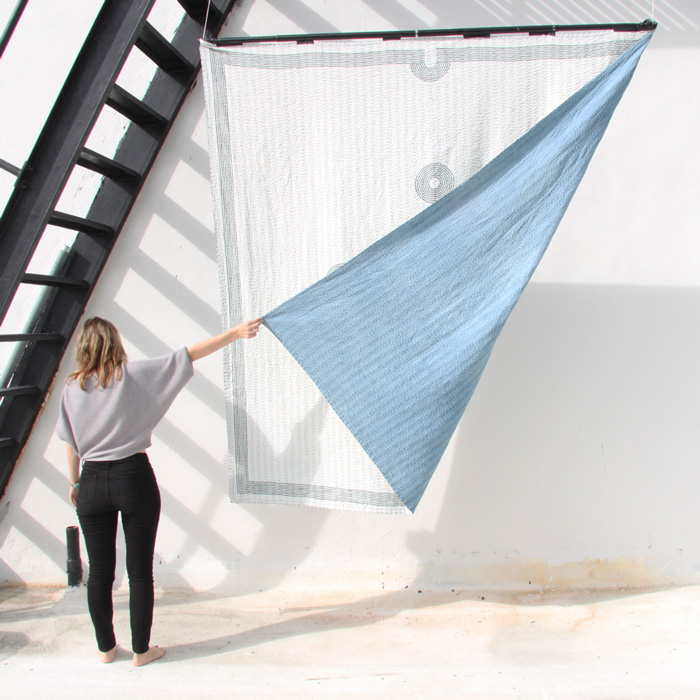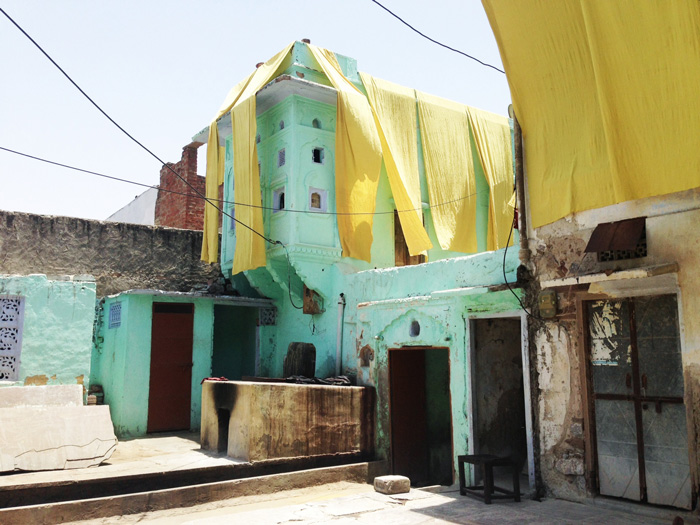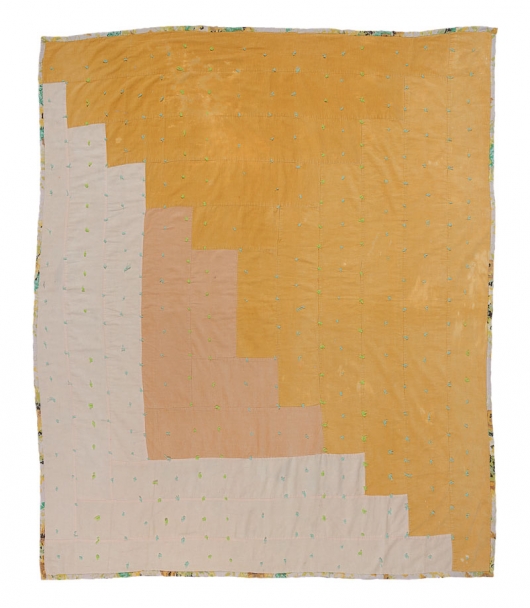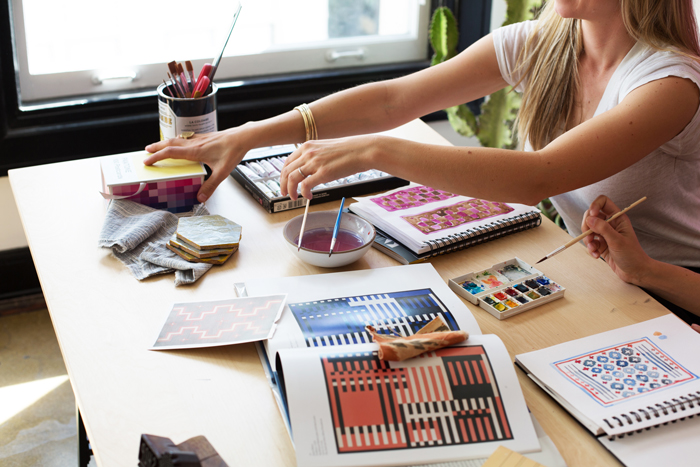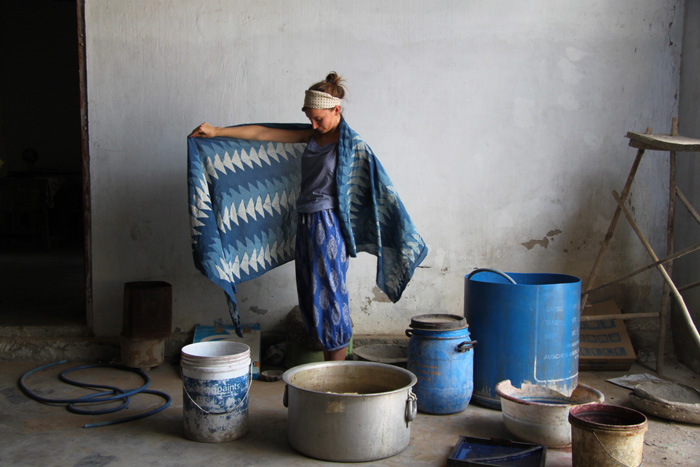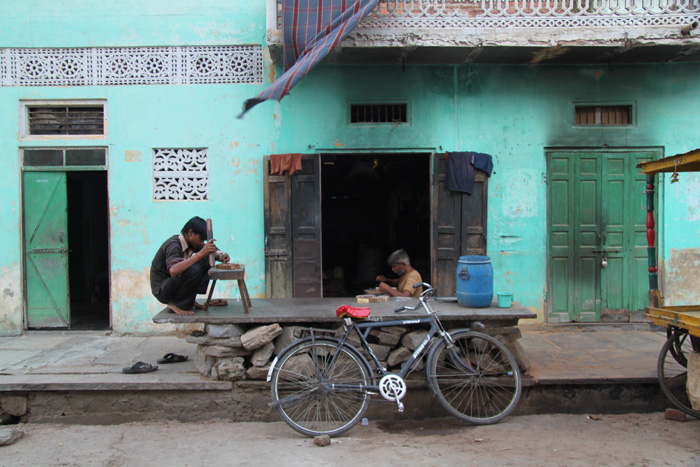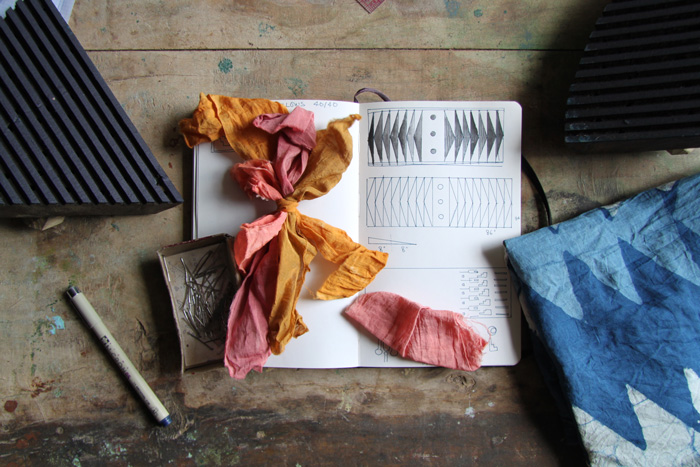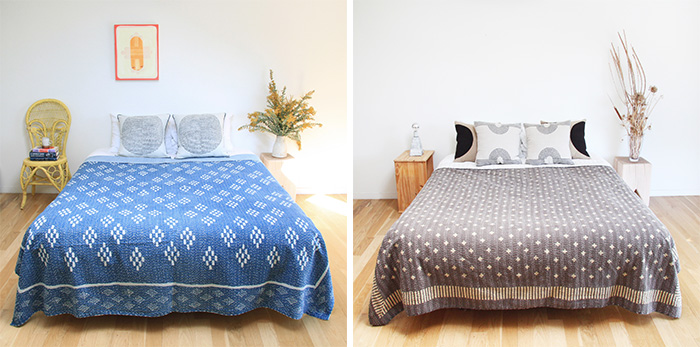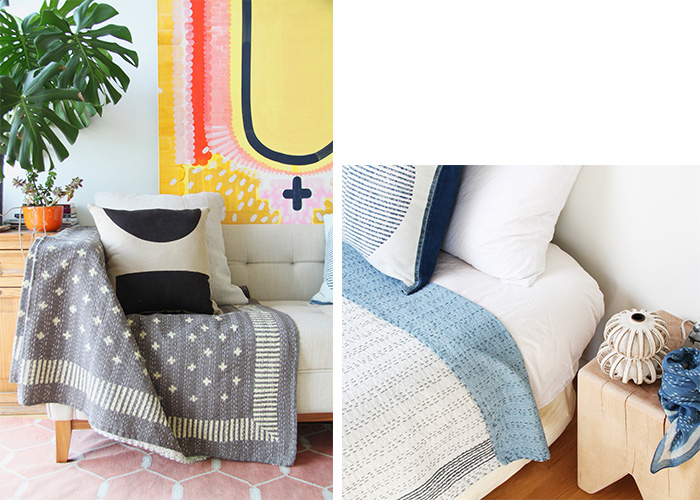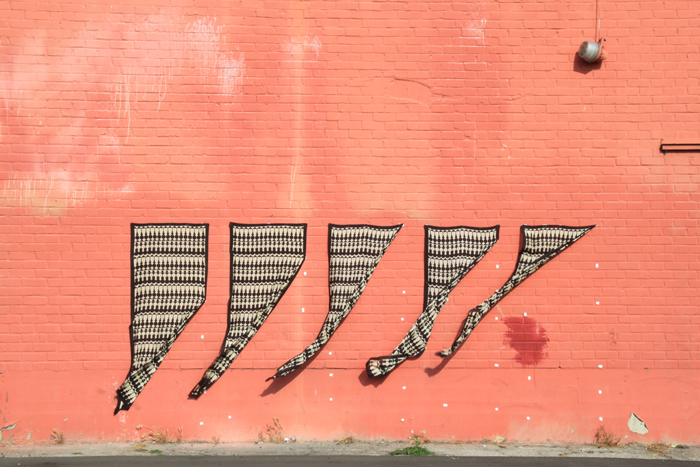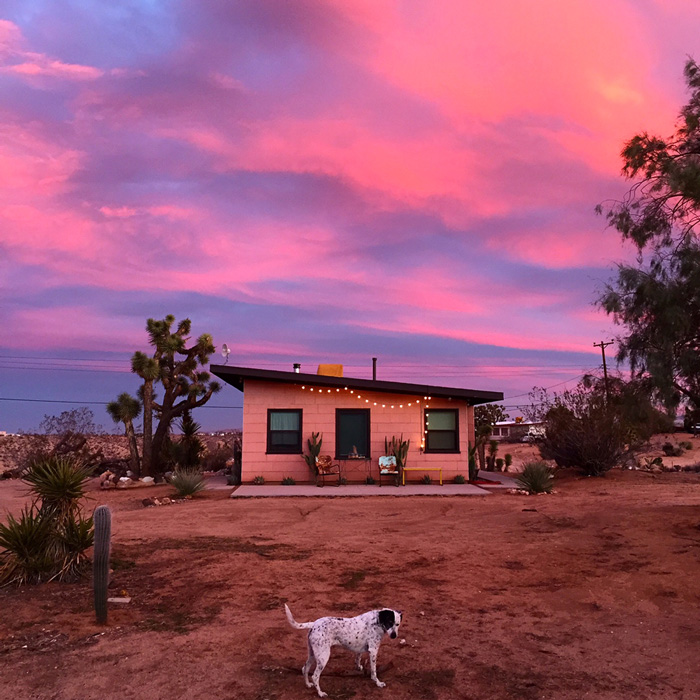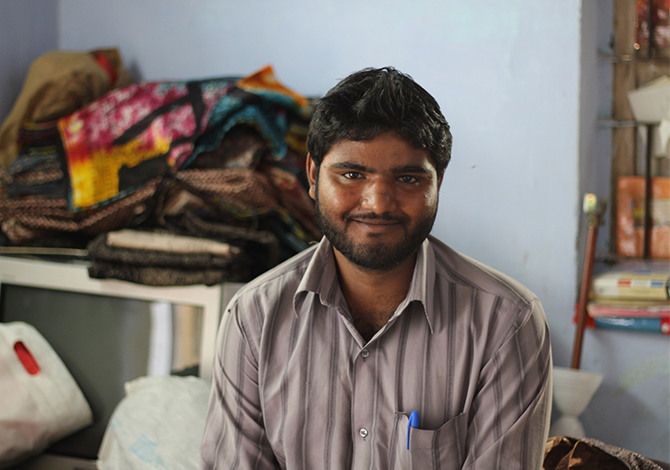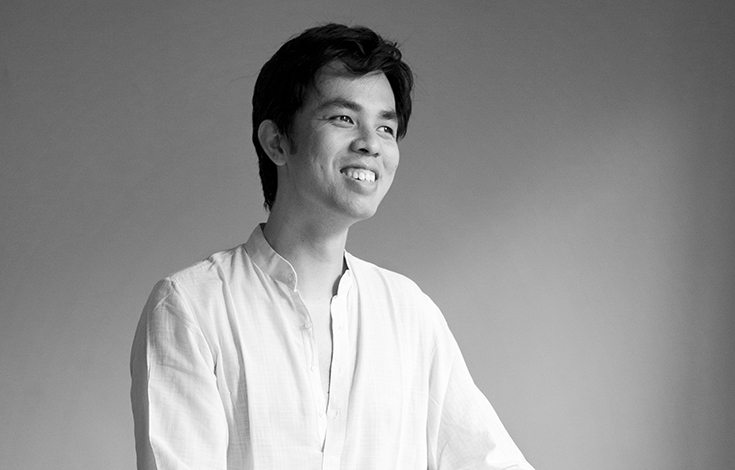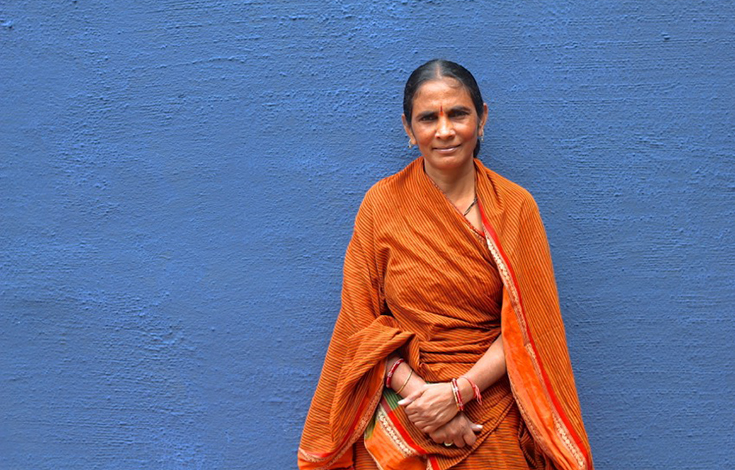Block Shop is a textile company founded by Los Angeles-based sisters Hopie and Lily Stockman. What began for them as an art project in 2010 has since grown into a fully operational wholesale and retail business – one that they see as a true collaboration of their California aesthetic and the skills of a family of hand block printers and dyers in Bagru, Rajasthan. Below is their story, as told by Hopie.
The beginning > We grew up in a family of four sisters on a farm in New Jersey. There was always an emphasis on making things together. Because our mom is a born teacher and an expert in all the local flora and fauna, nature was part of everything we did. Both my mom and my dad loved solving business problems, so there was constant talk of business strategy at our dining table. There was a recurring conversation about starting an organic sparkling drink company (never happened), and we loved arguing over its hypothetical name. Our dad really encouraged us to be entrepreneurial.
Above: image | Laure Joilet
There were also constant art projects. We turned an empty garage stall into our art studio as kids, and that’s where Lily and I began painting together … big murals on the floor.
Fast forward 15-ish years through a series of various and sometimes unrelated jobs, some in cubicles, others on the Mongolian steppes, tack on two years for grad school: Harvard Business School for my MBA in 2014, Lily at New York University for her MFA in 2012 – and we ended up in a very similar place: making paintings together in a living room.
I spent five years in private equity research for an investment consulting firm, which provided a stellar education in business fundamentals, capital markets, and team management. During this time, I dreamed of getting back to painting and making things; or doing what I’m actually good at (versus spreadsheet analysis). So I was able to use business school as a launching pad for starting a small, creative business and pursue the creative career I’d been dreaming of.
Above: image | Hopie with the Islesford quilt
Meanwhile, in 2010, Lily’s life as an artist was beginning to take off, and she followed her interest in Indian miniature painting to Jaipur to study under a master miniature painter. When she and her husband were living in Jaipur, Lily met an entrepreneurial young block printer, Vijendra Chhipa, through a mutual friend. They started collaborating on designs for unstructured paintings, which eventually became our staple oversized scarf. I visited six months later, and the three of us decided to print a few hundred scarves to sell online. We never did any advertising, it was all word of mouth, and before long our apartments were packed with inventory and boxes – pure madness.
Block Shop started as a passion project but quickly became a manifestation of both our dreams: designing, creating, and running a business with an emphasis on socially responsible business practices.
Building blocks > When we first launched Block Shop in Christmas of 2012, Lily was keeping a beautiful blog at the time, Big Bang Studio, which helped propel us into the broader blogosphere and drove our initial sales. Over the next year, our business grew via word of mouth, which enabled us to move to a proper studio in downtown LA. That was two years ago and we haven’t looked back: we’ve expanded our product line to include pillows, kantha quilts, and soon dhurries.
Above: image | Bagru, Rajasthan
We have a team of four in LA, and about 30 stockists who carry our products around the world. In India, we employ ~18 hand block printers, plus our wonderful Community Manager, Sonia Jain, who oversees production, quality control, fair wages, and community health.
Our healthcare initiatives in Bagru have evolved from a mobile clinic once a year to monthly programs tailored to the women and children in our community.
Our team in India is like an extension of Vijendra’s family (they share the name Chhipa), and we look forward to our twice-yearly trips to India as if we’re visiting our own family. Everyone works from their home workshops, and their homes are situated around a shared textile drying paddock, so there’s constant interface. That said, communication is certainly a challenge when we’re trying to oversee production from LA. Things like colour discrepancies from dye lot to dye lot are almost impossible to translate via iphone photos. So Sonia, our Community Manager, serves as our eyes on the ground, making sure that our production is running smoothly, and that community needs are being met via weekly check-ins to each printer’s home. We speak to Sonia and Vijendra once a week.
Our biggest production challenge isn’t in the actual production (although there are constant unforeseen “adventures” in the production of handmade products), but on the other end: educating our customers about the inherent imperfections of hand block printing.
Above: image | Linda Pettway ‘Log Cabin’ quilt
Our printers do incredible work, but stray dabu drips, or even the migrant cow hoofprint are an inevitable part of the process. The imperfections in the process are what make hand block printing, and Block Shop as a brand, magical.
We have no interest in changing a centuries-old process. So the challenge lies in educating the (mostly American) customer that imperfection is desirable and something to be celebrated. Most people get that, and we have incredibly loyal customers. Since we launched three years ago, we’ve noticed that customers have become more and more accepting of handmade imperfections which is a positive development not just for us, but for the rising popularity of handmade consumer goods.
Above: image | Laure Joilet
Relationships > Lily and I both design, and we both run different aspects of day-to-day business. We make all of our decisions together, we sell at markets and trade shows together, and travel to India together. That accounts for about 20% of our time. Otherwise, I’m in charge of business administration, and she’s our marketing guru.
It’s kind of like we share a brain, and it’s the most fun we’ve ever had. Working together as sisters is so refreshing because there’s no political maneuvering or diplomacy required, we’re just straightforward with each other. It actually makes the work environment quite peaceful; Block Shop work is like our haven from life’s other stresses. Of course we’ll get into run-of-the-mill sister spats from time to time, but we always come out on the same team.
Above: image | Hopie with prototype in Bagru
We work exclusively in Rajasthan because that’s where Lily used to live (Jaipur), so our relationships with our printers and weavers go back five years. We will always be, at our core, a hand block printing company, so our headquarters will always be in Bagru, where everything started. But we imagine that we will slowly branch out into other products made in other parts of the state. We have no plans to work outside India.
We come to India twice a year for a month at a time. We do all our prototyping in person with our team. We wouldn’t be able to spend such long chunks of time in India without our incredible team back in LA.
We have a fantastic studio director, Nisha Mirani, who manages our wholesale accounts and runs the LA studio. And our lovely operations associate, Yvette Yonan, runs our fulfillment and ops.
Above: image | block carvers in Bagru
Transparency > Transparency is our core operating principle. We want our customers to be able to see the faces and hands of the artists who make our textiles (and vice versa – some of our printers are now on Instagram). This has led to a tight-knit brand community which is what motivates us to show up to work every day.
Because we’re so transparent about the name of our printers and our workshop location in India, we’ve seen a steady stream of Block Shop copycats flow through Bagru over the past two years. It’s been a huge headache but we wouldn’t have done it differently.
Ultimately we’ve learned to ignore the copycats. The most powerful lesson in all this is how vital loyalty and trust are in a relationship: our printers have been approached by big companies in Delhi who ask them to print our exact designs at half our rate, and our printers refuse and tell us immediately. They know we’re in this for the long haul, they’ve known us for five years, we know their families and needs and we take care of each other. They have great pride in working for Block Shop, and we take immense pride in working with each of our printers. It’s so important to build genuine personal relationships, work together in person, share chai!
Above: image | design in progress
Mission > A brand extends so far beyond its products: it consists of a voice, a viewpoint, a sense of design, a life philosophy. We started our business with a mission, and sticking to that mission has been essential: make heirloom textiles that have high social benefit and low environmental impact. We donate 5% of our profits towards community healthcare initiatives. These initiatives always stem from community needs assessments i.e. identifying gaps in currently available healthcare through interviews with our printers and their families.
Our first initiative was a mobile general healthcare clinic and an eyecare clinic, which included providing glasses for 78 people, and cataract surgeries for 8 members of our community. Our second initiative was providing reverse osmosis and UV water tanks and water filters in the homes of all 18 members of our printing co-op. Our third initiative is monthly health education programs for the women and children in Bagru.
We plan to continue these initiatives with Sonia’s help, with a view towards health education and impact measurement so that our initiatives have long term effects. We’re learning as we go: our water filter initiative was our least successful to date, as the filters started to break down after one year, requiring constant maintenance that families didn’t want to schedule on their own. On the flipside, our eye care initiative has measurably improved quality of life via increased daily comfort and work productivity, which we continue to see two years after the fact.
Above: image | ‘Big Sur’ and ‘Gallatin’ quilts
Focused expansion > We’ve grown through careful, thoughtful product expansion. We started with scarves, and we’ve since moved into home textiles, releasing tight, focused collections one or two times a year.
Our distribution channel started with a strong online presence and engaged audience of direct consumers. Instagram was, and is, huge for us. Our wholesale accounts stemmed from this enthusiasm.
We did some trade shows early on, which weren’t actually helpful. Being in a random booth in a faceless sea of products is not our brand, not our personalities. It was a great learning experience in that we realised it was is not the side of retail we want to be a part of. We are specialists, we are small, but we have enormous reach through the Internet. We want to be known for making the most beautiful, innovative hand block prints with natural dyes in the world. That is our goal.
Above: image | ‘Gallatin’ on sofa, ‘Islesford’ quilt close up
We’ve recently begun to explore kantha embroidery for our home collection. Our point of departure is to celebrate and invigorate traditional Indian textile techniques, using our own modern geometric patterns. Hand block printing is our bread and butter given our relationship with the Chhipa family. Our bestselling block printed scarves are what we’re known for. That said, we’re incorporating other traditional textile techniques into our product line – like the hand-stitching for our kantha quilts, and weaving via hand looms for the line of dhurries we’re launching in July. At heart we are researchers and students of the craft, so we spend years researching who makes what best, and getting to know them and the history of their process.
Above: image | ‘Filial’ scarves in downtown LA
The Block Shop woman > Everything we make we make for our sisters and friends. The Block Shop woman travels. She appreciates the beauty of the natural world. She’s open-hearted and inquisitive. She’s a researcher. She reads, she has a point of view. She’s always running just a little bit late and tells good stories at dinner parties.
Lily and I share the same adoration for actresses like Angelica Huston, artists like Helen Frankenthaler, and musicians like Lucinda Williams – all women with a strong sense of themselves, an ability to be masculine and feminine at once.
Most of all, we’re inspired by the women who helped raise us. Our late surrogate grandmother, Auntie Mame, was the incarnation of the fictional, larger-than-life eponymous heroine. She was a horticulturist, traveled the world, read prodigiously and had an African grey parrot named Kato. A woman with a real point of view and personal style – that’s the Block Shop woman.
Digital & other references > To be honest, we don’t really look at blogs or websites regularly anymore because Instagram and email newsletters provide so much of the online content we’re looking for. In fact we really relish our design time offline when we’re in Joshua Tree or Rajasthan because we’re taking in the landscape and architecture through our own eyes.
Yvon Chouinard, who founded Patagonia in 1973 built a hugely successful, iconic brand which has stayed true to its mission of environmentalism over the decades. There are so many great business lessons to take from Patagonia (product quality, brand consistency, corporate culture, business practices, etc), but most of all we’re inspired by its unflagging dedication to its mission.
Anni Albers, especially her Bauhaus weavings. For her stunning, simple geometric patterns and for seeing art in the functional. Her book Selected Writings on Design is like the Block Shop Bible. Beatrice Wood, ceramicist and Dadaist muse. She led a truly inspired life. Heidi Julavits, author of The Folded Clock, whose specific brand of self-effacing realism is the most apt description of being a women in the arts in our era. Can’t recommend it enough.
Above: image | Lily’s cabin in Joshua Tree, CA
Work / Life > We’re literally outside (thanks to Southern California weather) when we’re not in the studio – hiking, running, swimming, bbq-ing with our respective dogs / wonderful menfolk. I live in Venice Beach, and Lily spends most of her leisure time in Joshua Tree. But Block Shop is part of everything we do so there aren’t really boundaries and we love it that way. The landscapes and buildings of the places we love – the Thar and Mojave Deserts, are what inspires our designs.

